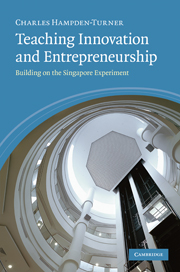Book contents
- Frontmatter
- Contents
- List of grids
- List of dilemmas
- Acknowledgements
- Introduction
- 1 Singapore’s challenge
- 2 The entrepreneurial ecosystem
- 3 How can innovative pedagogies be measured?
- 4 Co-defining innovative education
- 5 The Singapore results
- 6 Results of the Mandarin-speaking programme
- 7 Reconciling values
- 8 ‘It is only the Hawthorne Effect’
- 9 The programme that cannot stand still
- 10 Innovation and the future of the university
- 11 What are the implications of being able to teach innovation?
- 12 Is a new creative class arising?
- Notes
- Bibliography
- Appendices
- General index
- Index of dilemmas and reconciliations
9 - The programme that cannot stand still
Published online by Cambridge University Press: 05 July 2014
- Frontmatter
- Contents
- List of grids
- List of dilemmas
- Acknowledgements
- Introduction
- 1 Singapore’s challenge
- 2 The entrepreneurial ecosystem
- 3 How can innovative pedagogies be measured?
- 4 Co-defining innovative education
- 5 The Singapore results
- 6 Results of the Mandarin-speaking programme
- 7 Reconciling values
- 8 ‘It is only the Hawthorne Effect’
- 9 The programme that cannot stand still
- 10 Innovation and the future of the university
- 11 What are the implications of being able to teach innovation?
- 12 Is a new creative class arising?
- Notes
- Bibliography
- Appendices
- General index
- Index of dilemmas and reconciliations
Summary
If you are teaching innovation and entrepreneurship then you can never be satisfied with the existing courses and programmes. This is so because you need to model what you are teaching, take similar risks and explore similar kinds of new territory. You cannot expect students to experiment if you are not experimenting too. It is essential that new efforts be mounted on the top of earlier efforts like a fresh performance on a stage, so that each successive accomplishment transcends the previous one and teaches you something you did not know before. If students have their hearts in their mouths then teachers should be modelling the same kind of risk-taking. Let us recall that the TIP course was in part the students’ shared project, something they must help to make into a success. If the course is not genuinely experimental, why should the students get excited?
A major new theme in the course is the introduction of digital media, which in turn has a number of ramifications. I shall discuss these in turn.
(a) Film as an ongoing narrative drama
(b) The digital case clearing house
(c) Digital and other prototypes
(d) The City of Digital Dreams
(e) Whole system change and alternative futures
(f) Beyond the zero-sum game
The remarkable development over the last decade of digital media technology is the background of all six of these issues. Just as the personal computer put at the individual’s fingertips the power formerly wielded by large corporations only a few years earlier, so now are Hollywood’s resources, formerly unavailable, coming to many homes and offices in the land, although the skills to exploit these must still be learned. NTC has included as its Deputy Director Ray Abelin, an ex-Hollywood director, who has set out to see what digital media might do to expand entrepreneurship and innovation.
- Type
- Chapter
- Information
- Teaching Innovation and EntrepreneurshipBuilding on the Singapore Experiment, pp. 140 - 151Publisher: Cambridge University PressPrint publication year: 2009



